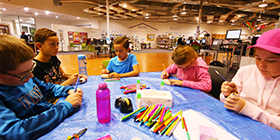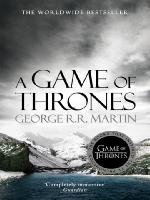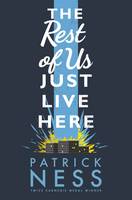 The School for Young Writers in Christchurch is holding a Summer Writing School and Workshops, 16-20 January 2017. The Summer Writing School comprises a week’s worth of writing for teenagers, with special guest tutors alongside some of our regulars. On the final day students will get an opportunity for 1:1 mentoring as they complete a piece for the special magazine that they will produce.
The School for Young Writers in Christchurch is holding a Summer Writing School and Workshops, 16-20 January 2017. The Summer Writing School comprises a week’s worth of writing for teenagers, with special guest tutors alongside some of our regulars. On the final day students will get an opportunity for 1:1 mentoring as they complete a piece for the special magazine that they will produce.
There are also opportunities for younger children (Year 7-9) to let their imaginations loose in short workshops with James Norcliffe and Heather McQuillan on the 24th January. Information can be found on their Facebook page. (Please note: the years 4-6 sessions on Jan 23rd are now full).
We spoke to Glyn Strange, founding director and Heather McQuillan, associate director of The School for Young Writers about the Summer Writing School and Workshops:
Why go to The School for Young Writers throughout the year? Who is it for and what will they get out of it?
The School for Young Writers is for Years 3 to Year 13. Young writers get the pleasure of working with skilled teachers in groups of like-minded children. Regular tuition produces results. We also have a correspondence programme for those who can’t make the class times.
What kind of writing activities and exercises do you do?
Heather: Stories, poetry in all its forms, creative non-fiction, jokes, flash fiction, memoir, song lyric, play script, monologue, twists on genre, fantasy, slam poetry, whatever the children ask for and whatever our creative tutors can come up with.
Tell us about some of the tutors at the school.
Glyn: James Norcliffe is one of New Zealand’s most admired writers of poetry (Burns Fellowship and many other awards) and fiction for young readers. Heather is also an award-winning writer of fiction for young people as well as poetry, short story and flash fiction ( She is the current National “champ” in Flash fiction). Gail Ingram is New Zealand’s best poet for 2016 (New Zealand Poetry Society). Greg O’Connell is renowned for his interactive poetry shows and poems published in the School Journal. Stephanie Frewen is an award-winning scriptwriter. The plays her students write are broadcast on Plains FM and many are preserved for all time in Radio New Zealand Sound Archives.
Can you share some top tips for youth who want to write?
Join the School for Young Writers (of course). And enter the competitions in our Write On magazine. Teenagers submit to Re Draft - an annual anthology of the best teenage writing in New Zealand.
What about young people who think "I'm no good at writing..."
Glyn: Some of our best writers said that when they joined us. We are not there only for the gifted and talented. People don’t know they have a talent until they try it.
Heather: Sometimes young people have not had the opportunity to express their own creativity through writing. Our programmes are “low stakes.” We don’t use rubrics, mark or judge writing. Our goal is to help a young writer develop a piece to be the best expression of their ideas. This is a joyful process.
What changes do you see in the students over the course of the year?
Glyn says the changes are "immense" and Heather agrees: "For some it takes a few sessions to warm up and let their ideas free. Once they do then amazing things happen. Learning that all writers redraft is often key to the breakthrough."
Can you share some highlights from the School for Young Writers this year?
Glyn: The greatest kick for me was to see the change in a young writer who came to us writing very dark stuff. By the end of the year, eligible to enter our annual Re-Draft competition for teenagers, this person won a place in the 2016 book The Dog Upstairs. This nationwide competition is for writers up to university level, so it’s a great achievement for such a young writer to win a place.
Heather: This year we held a poetry reading event in association with WORD Christchurch and New Zealand Poetry Day. It was a thrill to see usually shy young people stand up and read their pieces with confidence. I also love working in schools and a seeing the transformation over two days as reticent, vulnerable writers realise that they have something worthwhile to write, something that others want to read. Standouts have to be a group of Year 7/8 country boys (never laughed so much in a workshop) and a gorgeous group of teenagers in Queenstown who were open, enthusiastic and extremely talented. They even gave up their Saturday to attend.
Your favourite authors writing for children and young adults?
Of course we love James Norcliffe! Most of our young writers are also avid readers and they recommend writers to us!
Some of YOUR Top picks of books for youth in 2016?
Heather: Being Magdalene by Fleur Beale. I went back and reread her others. Anything Patrick Ness has written. I’m a bit behind on my YA reading having been a University student this year and reading the modernists. I’m looking forward to some holiday immersion in YA books.
What drives you to commit so much passion for this work?
Glyn: All of our tutors do it for the love of writing and with a passion for ensuring the future of New Zealand literature.
The School for Young Writers is based at Hagley College. What's the association?
Glyn: Hagley College offered to support us and we gratefully accepted. We are a separate organisation and a registered charity. Hagley is our venue.
Tell us about the publications the writing school is associated with.
Glyn: The School for Young Writers has always emphasised the importance of publication. Without it, writing is like a house without a roof. Write On magazine gives everyone a chance to strive for the pleasure of seeing their name in print and encourages them to lift their game as far as possible. The Re-Draft competition began when we had developed teenage groups whose work was good enough to publish in book form. Re-Draft challenges our senior students to pit their skills against the best in the country. The results are amazingly good. New Zealand literature is alive and well and has a good future. Your blog should include this.
What are some things you've heard the students say about their experiences at the writing school?
Glyn: You should see the smiles on their faces when they emerge after two hours of fun learning. They don’t need to say anything. It shows. The younger ones often excitedly share their work with Mum on the way home.
Heather: They keep coming back and stay for years. For some of the students The School for Young Writers is their safe place, they make special friends and can be themselves. We love quirky. We value individuality.
Check out what is on offer for youth at the Summer Writing School this January.















Add a comment to: Summer Writing School for Youth 2017